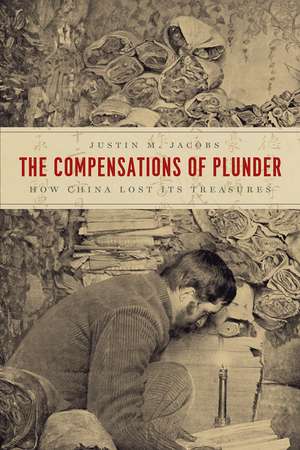The Compensations of Plunder – How China Lost Its Treasures: Silk Roads
Autor Justin Jacobsen Limba Engleză Paperback – 17 aug 2020
Preț: 223.85 lei
Nou
Puncte Express: 336
Preț estimativ în valută:
42.84€ • 44.92$ • 35.72£
42.84€ • 44.92$ • 35.72£
Carte tipărită la comandă
Livrare economică 08-22 ianuarie 25
Preluare comenzi: 021 569.72.76
Specificații
ISBN-13: 9780226712017
ISBN-10: 022671201X
Pagini: 352
Ilustrații: 32 halftones
Dimensiuni: 153 x 228 x 22 mm
Greutate: 0.48 kg
Ediția:First Edition
Editura: University of Chicago Press
Seria Silk Roads
ISBN-10: 022671201X
Pagini: 352
Ilustrații: 32 halftones
Dimensiuni: 153 x 228 x 22 mm
Greutate: 0.48 kg
Ediția:First Edition
Editura: University of Chicago Press
Seria Silk Roads
Notă biografică
Justin M. Jacobs is associate professor of history at American University. He is the author of Indiana Jones in History and Xinjiang and the Modern Chinese State. He also serves as editor of The Silk Road journal and hosts Beyond Huaxia, a podcast on East Asian history.
Cuprins
Introduction
1. Sahibs in the Desert
2. Accumulating Culture
3. Gentlemen of Empire
4. The Priceless Nation
5. Rise of the Apprentices
6. Foreign Devils Begone
Conclusion
Acknowledgments
Glossary of Chinese Characters
Notes
Bibliography
Index
1. Sahibs in the Desert
2. Accumulating Culture
3. Gentlemen of Empire
4. The Priceless Nation
5. Rise of the Apprentices
6. Foreign Devils Begone
Conclusion
Acknowledgments
Glossary of Chinese Characters
Notes
Bibliography
Index
Recenzii
“Jacobs tells the story of how the cultural relics of northwest China were collected, dispersed, and sometimes destroyed, in a new and refreshingly nonjudgmental way. Drawing on insights from literature on similar processes in the ailing Ottoman Empire as well as on primary sources in English, French, and Chinese, he narrates this story in granular detail and with a keen sense of the motives of the individual actors on both the Western and Chinese side of the story. Clearly the result of a very meticulously researched project, The Compensations of Plunder is a well-crafted and tremendously enjoyable read.”
"This revisionist work challenges Chinese nationalist discourse of how China lost its treasure during the turn of the 20th century to reevaluate the rational historical actors—Western archaeologists who went on expeditions in Xinjiang—through a new explanatory framework: the compensations of plunder."
"This beautifully written and theoretically sophisticated study focuses on Western expeditions to Xinjiang and the Dunhuang region from 1900 to 1930, particularly those of Aurel Stein and Paul Pelliot... The Compensations of Plunder also speaks to the politics of the Chinese frontier, Western culturalism and racism, and the development of Chinese archaeology."
"The Compensations of Plunder makes an important intervention in studies of the Silk Roads, cultural heritage preservation, and modern Chinese history. It lays the groundwork for further thinking about the intersection between empires, nation-states, and cultural heritage in ways that complicate and augment our understanding of the troubled history of twentieth-century collecting."







